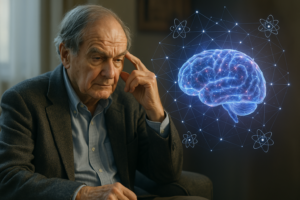Quantum Consciousness | Unraveling the Mysteries at the Intersection of Mind and Matter | Exploring New Research, Penrose’s Theories, and the Quantum-Classical Conundrum in the Brain
 The quest to understand consciousness has led researchers to explore realms far beyond traditional neuroscience. Recent discussions, such as those highlighted by Singularity Hub, suggest that the phenomenon of consciousness might be deeply intertwined with the strange, counterintuitive world of quantum physics. This emerging perspective posits that classical neuronal activity could be only the surface of a much deeper quantum process at play, challenging long-held assumptions about how we perceive and process reality.
The quest to understand consciousness has led researchers to explore realms far beyond traditional neuroscience. Recent discussions, such as those highlighted by Singularity Hub, suggest that the phenomenon of consciousness might be deeply intertwined with the strange, counterintuitive world of quantum physics. This emerging perspective posits that classical neuronal activity could be only the surface of a much deeper quantum process at play, challenging long-held assumptions about how we perceive and process reality.
The article from Singularity Hub brings into focus groundbreaking research that probes the possibility of quantum effects within the brain. It examines how certain quantum properties—like coherence and entanglement—might contribute to the functioning of neural networks. By suggesting that microtubules within neurons could sustain quantum coherence despite the noisy, warm environment of the brain, the research opens a fascinating dialogue on whether these elusive quantum effects could underlie our conscious experience.
In a compelling video discussion, Roger Penrose revisits his pioneering ideas on the quantum basis of consciousness. He reflects on his early work in neurophysiology and explains why he eventually sought an explanation beyond classical neural circuitry. Penrose articulates that the enigma of consciousness may hinge on the transition from quantum to classical realms—a gap where conventional computational models fall short. His conversation with Stuart Hameroff, who introduced the concept of microtubules as potential quantum processors, further underscores the need to consider non-computational, orchestrated quantum events in understanding conscious thought.
However, sustaining quantum coherence in the brain remains a significant challenge. Environmental decoherence—the process by which quantum systems lose their coherent properties due to interactions with their surroundings—raises questions about the practicality of quantum effects influencing brain function. The discussions in both the article and video highlight that while microtubules offer a plausible mechanism, the robustness of these quantum states under biological conditions is still under intense scrutiny and debate.
Critics of the quantum consciousness theory argue that traditional neuronal models sufficiently explain cognitive processes without invoking exotic quantum phenomena. They point out that the brain’s classical electrical and chemical signaling can account for the observed complexities of consciousness. Yet, proponents maintain that certain aspects of subjective experience and the unified nature of consciousness might require a fundamentally different, quantum-level explanation—one that embraces both the precision of physics and the richness of lived experience.
Supplementary research in quantum biology provides intriguing context to this debate. Studies in areas such as photosynthesis and avian navigation have shown that nature can, indeed, exploit quantum effects to achieve remarkable efficiency. These findings lend credence to the possibility that the brain, too, might utilize quantum phenomena in ways that are only beginning to be understood. As scientists continue to bridge the gap between quantum mechanics and biology, the potential for a paradigm shift in our understanding of consciousness grows ever more compelling.
In conclusion, the exploration of quantum consciousness represents a bold, interdisciplinary frontier that challenges our deepest notions of mind and matter. Whether through the lens of Penrose’s theoretical framework, the innovative research highlighted by Singularity Hub, or the emerging insights from quantum biology, the discussion invites us to reimagine the nature of reality itself. As we stand on the cusp of a new era in both neuroscience and quantum physics, the dialogue remains open—beckoning researchers and curious minds alike to explore what it truly means to be conscious in a quantum universe.
Key Takeaways:
- Quantum Coherence is Crucial: Emerging research suggests that sustaining quantum coherence in neural microstructures may be key to understanding the basis of consciousness.
- Interdisciplinary Research Advances: Integrating insights from quantum physics, neurobiology, and quantum biology opens promising new avenues for exploring the nature of consciousness.
- Bridging Quantum and Classical Realms: The ongoing debate underscores the challenge of explaining how quantum phenomena translate into the classical experiences of our conscious mind.
“The conscious mind may be the final frontier of physics, where quantum mysteries and classical reality converge.“
Dive deeper into the mysteries of consciousness—explore more articles, research updates, and thought-provoking discussions on SpeciesUniverse.com, and join us in the quest to understand the quantum nature of our minds.
More details: here
Related Content:
References:
- Singularity Hub (Website)
- Closer to the Truth (YouTube Channel)

Leave a Reply